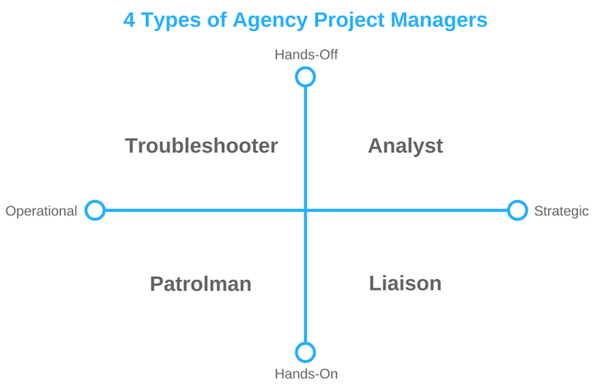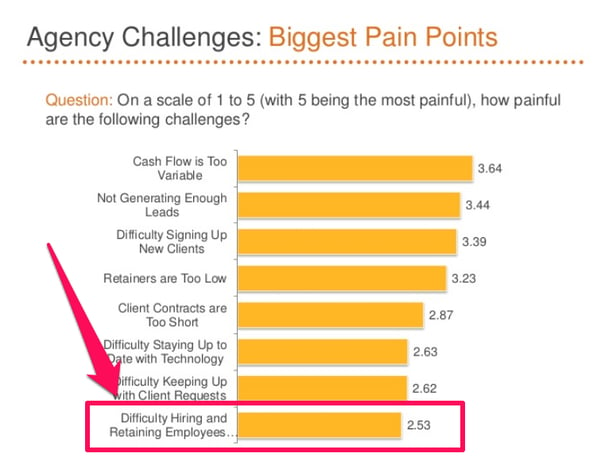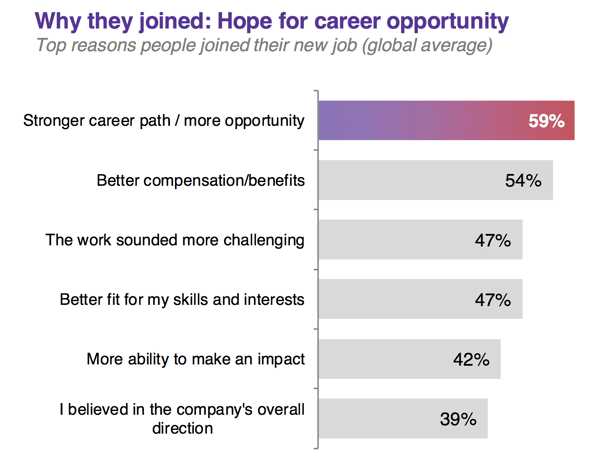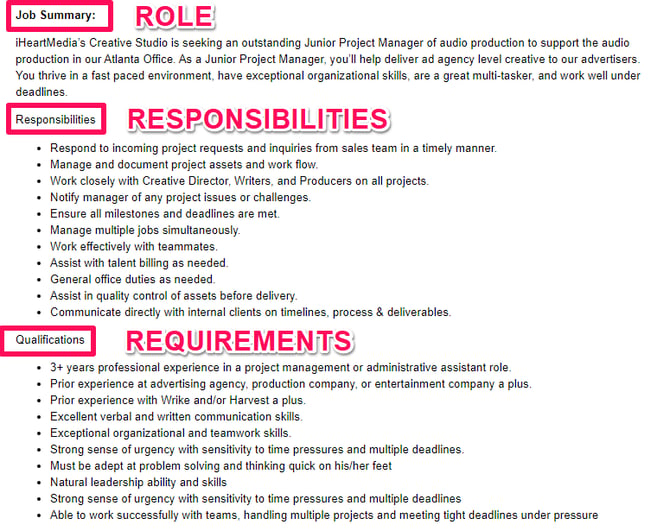Looking to hire a project manager for your agency? Follow these tips for a smooth and successful hiring process.
Running an agency can feel like fighting fires every day. You have to worry about scheduling resources, gathering requirements from clients, and managing the day-to-day of your projects.
One way to bring order to this chaos is to hire a project manager.
Project managers do a lot more than manage your project activities; they structuralize and streamline your operations, giving you the framework for accelerated growth. Any agency that wants to grow beyond a handful of clients needs to invest in hiring a project manager.
What exactly should you look for in a project manager? What qualities and skills should you prioritize? And where should you post your hiring ads?
I’ll answer all these questions and more in this guide.
Should You Hire a Project Manager?
If you’re reading this article, you fall into one of two categories:
- You don’t have any project managers in your team at the moment
- You have one or more project managers, but feel that they’re overworked or not useful for your current requirements
In either of the two cases, you have to really ask yourself:
Do you need a project manager?
There is seldom a straightforward answer to this question. Sometimes you need an account manager. Sometimes, a project coordinator might serve your needs better.
Let’s break down these alternate roles to help you understand your requirements.
Project Coordinator
Project coordinators are often called "Junior/Associate Project Managers". That's because their responsibilities overlap a project manager's, except with lower authority and experience requirements.
A project coordinator typically handles scheduling, client-focused communication, and task management. They don't have the skills and experience to handle complex projects, but they're more than adequate for handling multiple tasks across basic projects.
Think of them as "project manager lite".
PayScale.com estimates that the average project coordinator makes $49k/year. As you might have noticed, this is substantially lower than the pay for a project manager.

Hire a project coordinator if:
- Your existing project managers are overworked with scheduling and communication tasks
- You're a small agency that can't afford to hire a full-fledged PM
- You need someone to handle low-level management and coordination tasks
Small agencies where other generalists can handle high-level management work might be served better by project coordinators than project managers. Look for individuals with 1-3 years of experience in this role. Also look for certifications such as Certified Associate in Project Management (CAPM).
Account Manager (AM)
We’ve talked about the AM vs PM divide at length in another post. Account managers in mature agencies usually fulfill client-facing duties. These are the folks responsible for keeping clients happy and bringing new business your way.
But in smaller agencies, the AM vs PM divide isn’t always clear. Account managers often do project management duties and vice-versa. This can create a situation where you might not know whether you should get a PM or AM for your next hire.
Hire an account manager if:
The key is to ask two questions:
- Are your problems mostly internal (such as scheduling or resource management) or external (such as dealing with clients)?
- Are you oriented towards growing your client base or streamlining operations at the moment?
AMs with some background in project management can plug the holes in your client-side communication. They can also position your agency for attracting new clients. While their lack of pure PM training will impact operations, it can be worthwhile trade if you have other resources (such as a well-drilled team backed by a project coordinator) to pick up the slack.
If not, then you’re better off hiring a project manager while other senior leaders in the agency take over account management duties.
To sum it up, hiring a project manager should be a top priority if you:
- Struggle with project operations - task management, scheduling, client communication
- Don’t have a structured process for planning, managing, and monitoring projects
- Deal with increasingly complex projects that need a formalized management approach
Most agencies with 10-15 or more people will feel the need to hire a project manager. If this describes you, go ahead and start your search.
In the next section, we’ll look at the key qualities and qualifications you should look for when hiring great project managers for your agency.
What to Look For in Project Managers?
Look through 20 different project manager job opens and you’ll find the same few requirements: detail-oriented, well-organized individuals with exceptional communication skills.
But listing these generic qualities don’t really help you much when it comes to finding a great project manager. To be successful, you need to be specific.
And being specific starts with truly understanding your requirements.
Two Types of Project Managers
Over at the Teamwork blog, Grianne Forde breaks down project managers into four handy categories:

I feel that four categories are a little redundant. Most small and mid-sized agencies will typically see project managers in two flavors:
- Project manager as a strategist
- Project manager as an organizer
Let’s look at them in more detail.
1. The Strategist
From the outset, the discipline of project management can look a lot like juggling resources around to meet deadlines and task requirements.
But behind all those emails and spreadsheets (or better, Workamajig), there’s also a whole lot of strategic thinking. You have to create templates, plans, and frameworks for handling new and existing projects. You need to create and refine workflows. And you need a close understanding of the organization, its employees, and clients.
To handle all these tasks, you need a strategist project manager.

The strategist PM is crucial for mapping out all these stages in your PM process
Strategist PMs are able to go beyond the day-to-day running of the project and build the frameworks and structures you’ll need to run your projects for the next several years. They might not be the best organized and they might struggle with delegating tasks effectively, but strategists are crucial for building order into your PM approach.
You need a strategist project manager if:
- You don’t have any fixed framework or methodology for handling projects
- You don’t have clear templates and plans for managing projects
- You’ve never had anyone in a full-time PM role in your organization
If you’re a young agency, it would be better to hire a strategist PM initially. This can set you up for operational excellence in the near future.
2. The Organizer
While strategy might be important, effective project management essentially comes down to handling multiple tasks and people at the same time.
A well-organized project manager can excel in the most chaotic of organizations by the sheer force of their management skills.
Think of all the projects where you:
- Missed an important requirement because of miscommunication
- Missed a deadline because a key resource dropped out
- Struggled with delegating tasks to the right resource
An “organizer” PM can help you solve all these problems by bringing structure to your work. They can help you track tasks, schedule activities, monitor budgets, and keep clients in the loop - with or without a framework to guide them.
Hiring such a PM should be a top priority if:
- You’re already using a project management framework or methodology
- You have basic workflows, templates, and plans to manage your activities
- You deal with complex or a large number of projects involving multiple stakeholders and resources
Young agencies should think of hiring such a PM after they’ve formalized the strategic parts of project management. With a sound strategy in place, even a project coordinator can handle a lot of PM duties.
Once you’ve figured out what kind of project manager to hire, you can move on to the next step: attracting great project managers.
4 Crucial Tips for Hiring Project Managers
Creative and marketing agencies operate in a strange “Schrodinger’s Talent” situation where there is simultaneously a shortage and a surfeit of talent.

Difficulty hiring employees constantly ranks as one of the biggest pain points for agencies (Image source: Slideshare)
Mostly this happens because the truly skilled and experienced individuals tend to stay localized in a handful of top agencies. It’s understandable as well - competing against the likes of Ogilvy and McCann is difficult, both financially and creatively.
Given these conditions, what can you do to make your offer more attractive to project management talent? And what can you do to land the right candidate?
Here are a few tips to help you through the hiring process:
1. Evaluate Your Situation Objectively
An easy way to be dissatisfied with the entire hiring process is to have an incorrect understanding of your own agency and its current situation. Unless you’re truly objective about where you stand, you’re highly likely to make a hiring mistake.
Think of a situation where you might inflate your team’s experience and capacity for self-management. Based on this, you hire a project manager used to scaling well-drilled agency teams (rather than building them from scratch).
But because your team’s capabilities and the PM’s experience don’t match, you’re bound to be dissatisfied with the results.
So before you start the hiring process, be objective. Ask yourself:
- How experienced is your team? Do they have big agency experience?
- Have you adopted any formal project management systems and tools, or are you using ad-hoc solutions?
- Can people with only big agency experience thrive in your company, or do you favor self-starters?
2. Give Them What They Want
Why should a project manager working at a WPP company work for your agency?
While money is an obvious carrot, it’s not the only one. In one survey of the agency industry, 54% of respondents said that they switched jobs because of a lack of “opportunity for advancement”.
Even outside the agency industry, compensation comes second to career opportunities for most professionals.

Think about the kind of candidates you want to attract. Maybe they’re experienced professionals with half a dozen years at a big agency. Or maybe they’re skilled managers making the transition from another industry.
Place yourself in their shoes. What do these people want? What kind of change are they looking for?
For instance, an experienced project manager might want to transition from a big agency to a small one to get more hands-on experience growing a team from scratch. Another person might choose your small agency to get a better title and senior management experience.
Highlight these aspects of the job in your ads and you’ll have a better time attracting good candidates.
3. Make a List of Your “Must-Haves”
Before you start hiring, make a list of your “must-haves”, “good to have”, and “nice to have” qualities, qualifications, and skills. You might be able to negotiate on the latter two categories, but your “must haves” should be non-negotiable.
For instance, you might want your project manager to have prior experience. More than 7 years might be “nice to have”, and more than 5 years “good to have”, but at least 2-3 years should be your “must-have”.
Get your entire team involved when deciding these “must-haves”, especially your creative resources. These are the people who will work day in and out with the project manager. It helps to understand what they truly want from their managers.
Some obvious “must-haves” for most agencies are:
- Good communication
- Team-oriented
- Detail-oriented
- Organized
- Interested in your agency’s area of focus
- Natural leader
Also, keep an eye out for red flags. A candidate that was let go from an employer because of ethical violations is a no-go, as is someone found guilty of faking experience.
4. Write Better Ads
Most job ads make four critical mistakes:
- They talk too much about the company, not enough about the job
- They don’t do a good job of explaining the role and responsibilities
- They don’t include any criteria for filtering candidates
- They don’t give candidates clear instructions for sending in an application
Your ads don’t have to sound like sales copy, but they must be informative. Give candidates all the information they need to figure out whether you are worth their time.
A good structure to follow is to use the Role-Responsibilities-Requirements framework. Within this framework, you’ll identify the role first, followed by the responsibilities associated with the role, and finally, the requirements each candidate must meet.
This ad is a great example of this structure in action:

If you’re a small agency, it’s also a good idea to identify your company first.
While you’re at it, make sure to post your job ad on the right platforms. Posting on Monster and Indeed will land you far too many and far too untargeted leads.
Instead, share your job ad on platforms like Workamajobs where you’ll get access to niche creative industry-focused talent.
One way to make the entire project management experience smoother - even if you don’t have a dedicated project manager - is to use a tool like Workamajig. Workamajig brings structure to the chaos of managing an agency.
Test drive it today to see how it can help your business grow.

